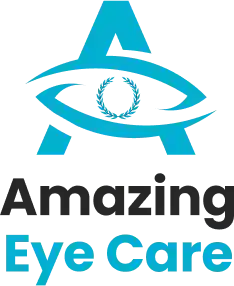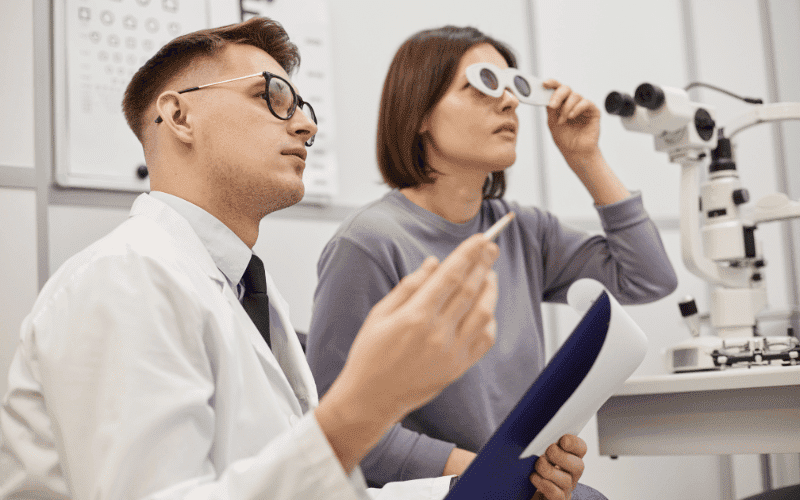Did you know that with early detection and treatment, approximately 80% of vision loss can be avoided? Keeping your eyes healthy overall and for optimal vision requires routine eye exams.However, many people do not know what questions to ask their eye doctor during their appointment. You may make more informed decisions about your care and improve your understanding of your eye health by asking the proper questions.
This blog will provide you with the top 10 essential questions to ask your eye doctor to maximize the value of your next eye exam and keep your vision in top shape.
Understanding Eye Health
How Vision Changes Over Time?
As we age, our vision naturally evolves. In childhood, our eyes are typically very adaptable, but presbyopia often sets in by the time we reach our 40s, making it harder to focus on close objects. This is a common and normal part of aging.
Vision impairment can result from disorders like cataracts that erode the lens of the eye over time. Additionally, the risk of developing conditions like macular degeneration increases with age. Understanding these changes can help you better anticipate and manage your eye health.
Common Eye Conditions and Their Symptoms
Several common eye conditions can impact your vision. For example, glaucoma, which is characterized by elevated intraocular pressure, might result in blindness if left untreated. Symptoms may include tunnel vision or seeing halos around lights.
When the center portion of the retina is affected by macular degeneration, blind spots, or distorted vision result. Diabetes can induce diabetic retinopathy, which damages the retinal blood vessels and may cause changes in vision.
Recognizing symptoms early, such as blurry vision or difficulty seeing at night, is key to seeking timely treatment.
Questions You Must Ask Your Eye Doctor
1. What is the current health of my eyes?
This question helps you gauge whether there are any underlying issues with your eye health. Understanding the overall condition of your eyes allows you to address potential problems early.
Your retinal health, eye pressure, and any indications of eye illnesses will all be evaluated by your eye specialist. They may discuss the health of your cornea and lens, ensuring no signs of conditions like cataracts or glaucoma.
2. Are there any signs of eye disease or conditions?
Detecting eye diseases early is crucial for effective treatment and management. Early identification is crucial because conditions like glaucoma and macular degeneration can progress silently.
Your doctor might explain if you have any symptoms or signs that indicate eye disease. They will discuss your risk factors and recommend follow-up actions or treatments if necessary.
3. How often should I get my eyes checked?
Regular eye exams help monitor changes in your vision and catch issues before they become serious. The frequency of your exams depends on various factors like age and health history.
Your eye doctor will provide recommendations based on your specific needs. For example, younger, healthy individuals might need exams every two years, while older adults or those with existing conditions may require annual visits.
4. What should I know about my prescription?
Understanding your eye prescription helps you choose the right corrective lenses or procedures. It ensures that your eyewear effectively addresses your vision needs.
Your doctor will explain terms related to your prescription, such as nearsightedness (myopia), farsightedness (hyperopia), or astigmatism. They will also discuss how these conditions impact your vision and how your lenses correct them.
5. Are my current glasses or contact lenses still suitable?
Ensuring your corrective eyewear is up-to-date is important for maintaining clear vision and comfort. Your needs may change over time, affecting the suitability of your current eyewear.
Your eye doctor will review your current prescription and evaluate whether your glasses or contacts are still effective. They may suggest adjustments or new lenses if your vision has changed.
6. What are my options for vision correction?
Knowing your options allows you to choose the best method for your lifestyle and preferences, whether it is glasses, contacts, or surgery.
Your doctor will discuss various vision correction methods, including traditional glasses, contact lenses, and surgical options like LASIK. They will help you understand the benefits and potential drawbacks of each option.
7. How can I protect my eyes from future damage?
Preventing future eye issues is essential for long-term eye health. Lifestyle changes and protective measures can make a significant difference.
Your doctor will provide advice on protecting your eyes from UV light, maintaining a healthy diet, and avoiding harmful habits like smoking. They might recommend specific protective eyewear or supplements.
8. What are the warning signs I should watch for?
Being aware of warning signs helps you seek prompt treatment and prevent potential vision loss.
Your doctor will outline symptoms to watch for, such as sudden vision changes, eye pain, or persistent headaches. They will advise when to seek immediate help if you experience these symptoms.
9. How does my overall health impact my eye health?
Your general health can significantly affect your eyes. Conditions like diabetes or hypertension can lead to serious eye issues if not managed properly.
An Atascocita eye doctor will discuss how your overall health impacts your vision and eye conditions. They may suggest coordinating care with other health professionals to manage conditions that affect your eyes.
10. Are there any recent advances in eye care that I should know about?
Staying informed about the latest advancements can enhance your eye care routine and provide new treatment options.
Your doctor will update you on recent technological advances and new treatments. This could include the latest in laser surgery, innovative contact lenses, or new medications.
Choosing the Right Eye Doctor
What to Look for in an Eye Doctor?
Finding the right eye doctor is essential for receiving quality care. Look for a professional with board certification and a good reputation. They should have experience in diagnosing and treating a wide range of eye conditions.
Compassionate and clear communication is also important. Your doctor should be patient and willing to answer all your questions thoroughly.
When to Seek a Specialist?
Sometimes, you may need to see a specialist. If you have complex eye conditions or need advanced treatment, an ophthalmologist or a specialist in a specific area of eye care might be required. They provide more focused care and expertise for specific issues like retinal diseases or complex refractive surgeries.
Asking the right questions during your eye appointment can make a significant difference in your eye health. From understanding your current eye condition to exploring treatment options and preventive measures, these questions ensure you get comprehensive care. Prepare for your next visit by using these questions to engage with your eye doctor fully. Your vision is precious—do not miss the chance to keep it at its best.


